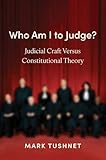Who Am I to Judge? : judicial craft versus constitutional theory / Mark Tushnet.
Publisher: New Haven : Yale University Press, 2025Description: 197 pages 23 cmContent type:- text
- 9780300277012
- 347.731
| Item type | Current library | Shelving location | Call number | Materials specified | Status | Notes | Barcode | |
|---|---|---|---|---|---|---|---|---|
 BOOKs
BOOKs
|
National Law School | General Stacks | 347.731 TUS (Browse shelf(Opens below)) | PB | Available | Recommended by Prof. Dr. Arun K Thiruvengadam | 40180 |
Browsing National Law School shelves,Shelving location: General Stacks Close shelf browser (Hides shelf browser)
INTRODUCTION;
CHAPTER 1. Looking for Good Judgment in All the Right Places;
CHAPTER 2. Judging Without Theory: The 1930s;
CHAPTER 3. What Is Constitutional Theory and Why Should We Care?;
CHAPTER 4. Why It’s a Mistake to Ask Whether Originalism Is a Good Constitutional Theory;
CHAPTER 5. Why It Doesn’t Take a Theory to Beat a Theory;
CHAPTER 6. Students for Fair Admissions and the Craft of Judging;
CONCLUSION;
BIBLIOGRAPHIC ESSAY;
INDEX.
A leading legal scholar asks a fundamental question: Do we need a theory of constitutional interpretation? Do we need a theory of constitutional interpretation? It is a common argument among originalists that however objectionable you may find their theory, at least they have one, whereas their opponents do not have any theory at all. But as Mark Tushnet argues, for most of the Supreme Court's history, including some of its most exceptional periods, the Court operated without a theory. In this book, Tushnet shows us what a constitutional theory actually is; what judges need from it and why they probably can't get what they need; and the great harm that results when judges allow theory to dictate bad policy. It is not theory that matters, Tushnet argues. The vitally important, indispensable quality in a judge is good judgment. -- Provided by publisher
There are no comments on this title.







